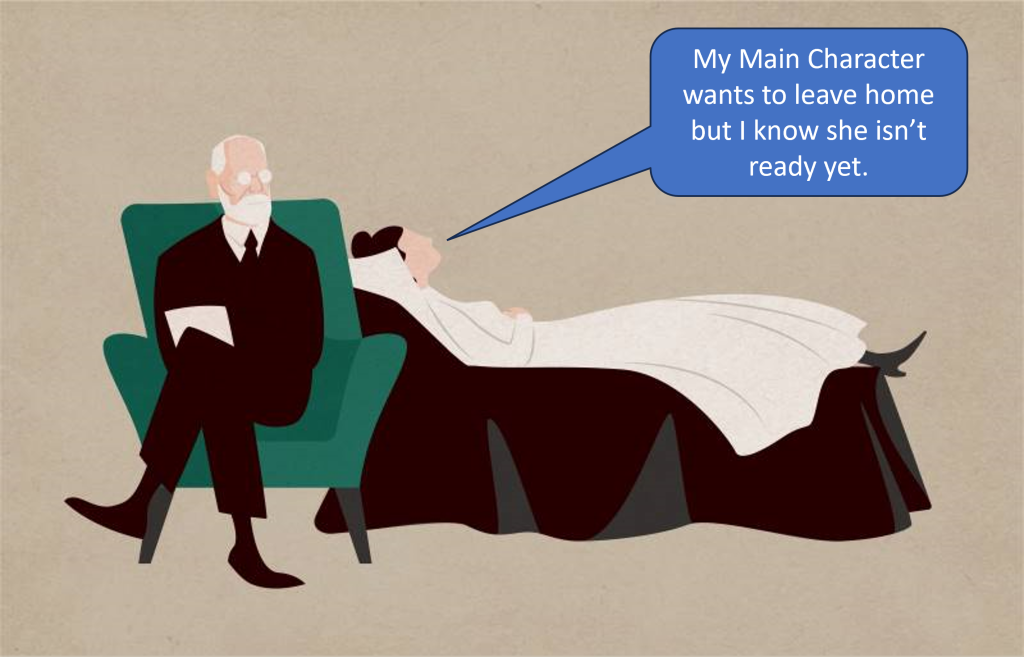
Minds of their own
To begin with, writing requires the ability to disassociate oneself from true reality and go with the version that is inside one’s own head. We often call this imagining of other worlds and non-existent people ‘fantasising’, but for writers, it is more than idle imagination. We have to craft at it. It is possible that we lean towards a certain type of madness!
Writers need their imaginary worlds. Deeply into a story we don’t just imagine these places, we live there. We are, after all, trying to get our readers to rent space in our universe while they ride along on our story, and nobody likes an absentee landlord!
Likewise, we have to conjure up the people to fill our worlds. Our characters start out as ideas. We may visualise what they look like, define the circumstances of their life and have a plot which determines the evils that will befall them. However, that is only the start, and as we go about the writing process, these quickly-sketched profiles soon start to develop characteristics, nuances, and before we know it, minds of their own.
Yes, minds of their own. What a strange concept, don’t you think?
That may be the point where things get interesting because suddenly, like a parent with a reluctant teenager in tow, we discover that we are no longer in tight control; the character developing through the words of our story has other ideas.
Writers are forever trying to make their readers believe in their characters. You can’t do that throughout the long process of writing a novel without starting to believe in them yourself. The inanimate matter of a Golum is given life by a word written on or placed within its head. It is an ancient recognition of the power of writing, the power to bring forth life.
I definitely talk to my characters, though more often than not, this takes the form of a dialogue between the people I put in my stories. It’s a bit more disturbing to talk to the characters directly, as myself, but for the most part I am that strange voyeur, the director of the play, and the omniscient holder of my own imagination, running events through and getting my characters to interact.
I would like to think a lot of authors must be like me, at least a little bit. That said, the writing process is in our heads, and maybe we are all different.
The author as mother
But what exactly is our position when we talk to our characters? By that, I am referring to the nature of our relationship to these beings we have created. I’ll briefly borrow here from a transactional analysis concept which puts people into specific positions Parent (P), Adult (A) and Child (C). I’m betting we writers mostly tend to do our direct transactions as Parent to Child. Because that is how we see ourselves.
At this point in my evaluation, ten minutes of frenzied daydreaming and zero research has led me to an even more startling realisation. All writers are mothers. Because in creating – giving birth – to our characters that is what we become. Congratulations, male writers – you have achieved something amazing! (Even if it was more in the literary fashion rather than in the literal sense.)
From a psychoanalytical viewpoint, Freud helped to point the finger at mothers, as if everything bad in a boy’s development could be laid at their feet. The mother-daughter relationship was always a bit more complex for him, but most analysts agree that it is fraught with tensions. It goes this way for mother-writers too.

I will take a moment to digress here very slightly into the complex world of my own stories. In my Forgotten Wings series, Sapphira also has huge mother issues (she is an angel and her Mother created the universe after all). Perhaps the author-character dynamics have turned me, with my own writer’s god-power to create fantasy universes, into a version of that ultimate Mother too, and I fear the potential breakdown of our author to character relationship as it is subsumed within the stuffy-parent to rebellious-child one.
Yes, I have these crazy kinds of thoughts! And I write them down. And you read them.
Maybe it was to protect our relationship that I went and projected the mother characteristics back onto my young heroine. In my stories, she now has her own babies and the matriarchal role of being the Queen of Demons. I wonder if she doesn’t hate me for it. I guess all writers’ plots are steaming with our own subconscious drives.
Summary
We writers create worlds and populate them with people. We are their de facto mothers. Our babies can become so real that not only might we talk to them, but we bestow on them our anxieties and issues. It’s a bit like being a real parent. In fact, I fear so many of my characters will end up in therapy because of their author. I guess that they can quite rightly point to the fact that I am entirely responsible for what happens to them: It’s mummy’s fault!
So, I’ll leave you with this thought.
Nearly all people have some anxieties because of their upbringing and family relationships, and well-written characters should probably have them too, but we don’t have to purposely write those characteristics in; we just have to go along with being mothers, nurture them and see what turns out.
